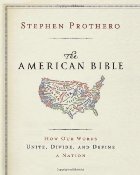
The American Bible by Stephen Prothero
 Stephen Prothero’s new book, The American Bible, is a clever arrangement of significant documents from America’s beginning to fairly contemporary times. The American Bible is arranged not so much chronologically as thematically.  The themes echo sections or “books†of the Bible. And it works for the most part, and proved an interesting way to organize the material.
Stephen Prothero’s new book, The American Bible, is a clever arrangement of significant documents from America’s beginning to fairly contemporary times. The American Bible is arranged not so much chronologically as thematically.  The themes echo sections or “books†of the Bible. And it works for the most part, and proved an interesting way to organize the material.
Prothero switches between “books†and collections of books – so there is Genesis, The Law (presumably a reference to the Pentateuch), Chronicles, Psalms, Proverbs, and then The Prophets, Lamentations, The Gospels, Acts and Epistles. Interestingly enough, the book of Revelation is not represented.
By and large The American Bible is an objective selection of interesting bits of what the author refers to as American Scripture. Prothero’s format is to offer a brief contextual explanation of the piece selected, the document either whole or in part, and then commentary – either contemporaneous or subsequent. Frequently, the author includes contemporary material along with the “scripture†being discussed. It seems as though these writings also carry the weight of “American Scripture.â€
In spite of objectivity in his choice of selections for his Bible, Prothero’s biases do come through in his writing. They are subtle but unmistakable. It’s unfortunate. Each time one of these little jabs pop up in either his introductory remarks, or in his descriptions of the commentary, they cause the reader to pause and question other aspects of the book because of these slips.
Prothero lets his bias show pretty broadly in the Epilogue, in which he asserts that his American Bible is, like the Constitution, a living document. Here is where his analogy breaks down. Although he admits that religions let their scriptures do the heavy lifting, and that some have closed canons and others open ones, he fails to recognize that truth is truth and not subject to augmentation. To be sure the American canon of political thought will continue to expand over time, however, it is not a religion. In his Epilogue, Prothero attempts to don a cloak of intellectual superiority, casting aspersions on both the right and the left. But the subtext is that the Left has a problem with implementation rather than philosophy.
But, if Prothero has an ax to grind, so be it. The American Bible is still worth reading as a broad survey of what Mortimer Adler might have called “The Great American Conversation.â€Â In The American Bible you’ll find the text of landmark SCOTUS decisions like Roe v. Wade and Brown v. Board of Education. These are surprisingly accessible and interesting to read as are the subsequent commentaries. The author adapts the notion of religion as a chain of memories into his selections for The American Bible. Hence he depicts commentaries and arguments throughout American history as a continuous conversation across the ages. For instance, the famous shining city on hill borrowed from John Winthrop and used by Reagan, has a long and illustrious historical derivation. Winthrop developed his sermon “A Model of Christian Charity†from the Sermon on the Mount. In one of the more perceptive observations in the book, Prothero illustrates how this notion has been used by both the left and the right to justify the concept of a conditional covenant between America and God. For some God’s blessings are to be earned, while for others they are the reward for America’s goodness. Still others, like the reverend Jeremiah Wright think God should punish America, while some on the right suggest that 9/11 was God’s punishment.
God’s judgement notwithstanding, The American Bible is not analogous to scripture. The themes are not unified, nor are they sanctified as Prothero demonstrates in his choice of commentaries on the Constitution. To be sure, there are those who revere it, but there are at least as many who despise it and what it stands for – because they find it archaic and limiting. Others condemn it for being too secular, too racist or too religious. In the civil war, both the North and the South claimed it as their own.
The American Bible is a fascinating collection of famous American texts bundled with relevant commentary which is sometimes enunciated more than 2 centuries after the fact. This is evidence that ideas are important both as agents of change and stability. Arguments over things like “the rule of law†are as important today as they were in 1776 and people are still fighting over these ideas today.
In reading The American Bible, this reviewer found himself agreeing with some of the commentary and cursing others. Prothero has definitely succeeded in depicting “How Our Words Unite, Divide and Define a Nation.â€
 The posts are coming!
The posts are coming!

1 comment
I listen to a lot of talk radio and the idea of scripture influencing America is a subject that comes up fairly frequently. I think all the tidbits and facts in this book would be particularly interesting.
Thanks for being on the tour!
[Reply]
Leave a Comment